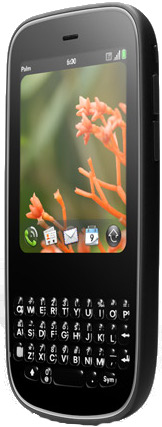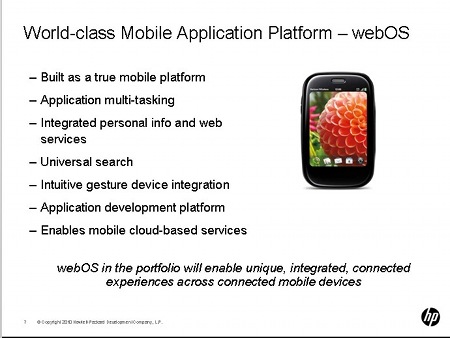HP to buy Palm, put WebOS on more devices
Apr 28, 2010 — by LinuxDevices Staff — from the LinuxDevices Archive — 1 viewsLong-suffering smartphone maker Palm finally may have found a financial savior. Hewlett-Packard, the world's second-largest IT systems provider, announced in a teleconference that it has agreed to purchase the struggling smartphone maker for $1.2 billion in cash on hand, or about $5.70 per share.
An HP spokesperson said Palm's current chairman and CEO, Jon Rubinstein, is expected to remain with the company. HP also said that it expects the acquisition to close during its third fiscal quarter ending July 31.
 Palm, which makes the Palm Pre and other connected phones, has been struggling financially for most of the last decade. The company has invested a great deal of time and capital in its Linux-based WebOS along with the Palm Pre and Pixi (right), but it hasn't been able to compete well with Apple's iPhone and a flood of Android devices from several makers.
Palm, which makes the Palm Pre and other connected phones, has been struggling financially for most of the last decade. The company has invested a great deal of time and capital in its Linux-based WebOS along with the Palm Pre and Pixi (right), but it hasn't been able to compete well with Apple's iPhone and a flood of Android devices from several makers.
Palm sold only 408,000 phones last quarter; in contrast, Apple sold 8.7 million iPhones during the same time period.
HP, the world's second-largest IT systems provider, now re-enters a business in which it has had limited visibility and success: connected telephones. But smartphones aren't the only thing for which HP is investing so much "cash on hand" in Palm.
Todd Bradley, executive vice-president of HP's Personal Systems group and a former executive at Palm Inc., told a webcast audience April 28 that HP sees not only a $100 billion smartphone market [and growing by 20 percent per year] to tackle but also new opportunities making "additional connected mobile form factors."
Bradley didn't say it outright, but his inference was to an HP-Palm branded tablet computer to compete with Apple's super-hot iPad. However, HP executives declined to provide a timeline for when WebOS will make the leap to devices beyond today's Pre and Pixi.
"We anticipate that with the WebOS, we'll be able to aggressive deploy an integrated platform that will allow HP to own the entire customer experience, to nurture and grow the developer community, and provide a rich media experience for our customers," Bradley said.

A slide from HP's presentation announcing the acquisition of Palm
(Click to enlarge)
Analyst comments
Analysts were initially divided on what the acquisition means to HP, Palm and the IT industry in general.
"I am very surprised at this," Gartner analyst Ken Dulaney told eWEEK. "I am puzzled from what I've picked up — that they [HP] want to use WebOS on tablets and netbooks. I don't know why they'd go after that market. I don't see much upside in this.
"WebOS still needs a lot of work. HP's going up against Nokia and other big players. They're also a partner of Microsoft; this isn't going to make Microsoft very happy.
"The best thing I could say about this is that they get a really good group of people in Palm, whom I have a lot of respect for, and it gives them an organization that is much stronger than what they've got for the smartphone business."
Ken Hyers, senior analyst at Technology Business Research, told eWEEK that "HP is making the move to give it a serious smartphone business that it can sell into enterprises. It already had a smartphone business, the iPaq, that it inherited from Compaq, but it was merely a blip on the market screen."
HP has been a player in the smartphone market for years, and no one really knows about it, Hyers said.
When compared to handsets rolled out over the years by the likes of Nokia, Apple and others, and now all the Android-based phones, Hyers said "HP devices just could not compete. They still sell [iPaqs] through their enterprise business, but it's so small that … you just never see HP's line of devices."
What HP is getting in this deal is a company that, while they had their financial and marketing woes, still makes solid devices, Hyers said. HP "brings with it the PalmOS, a very good mobile operating system, Hyers continued. "Palm also comes with a lot of solid IP. On the other side, Palm is coming to a company that has vast resources and strong channels into the enterprise. And it's really the enterprise that is the key here."
Forrester analyst Charles Golvin said he thought the transaction was a good news-bad news deal.
"The good news is that HP made a strong move toward becoming a player in the mobile market," Golvin said. "The bad news is that it's the wrong move.
"Palm could be valued for its brand, its intellectual property, its platform, or its people. HP doesn't need the Palm brand; the IP helps an existing player, not a new entrant; we don't think the WebOS platform is viable long term in the face of its competition. HP could sweep up Palm's people individually at a much lower price. HP needs a strong presence in mobile, but Palm doesn't deliver that."
Further information
An HP presentation regarding the acquisition, along with a webcast transcript, may be found on the company's website, here.
Chris Preimesberger is Senior Writer at our sister publication eWEEK. eWEEK Senior Editor Jeff Burt also contributed to this story.
This article was originally published on LinuxDevices.com and has been donated to the open source community by QuinStreet Inc. Please visit LinuxToday.com for up-to-date news and articles about Linux and open source.